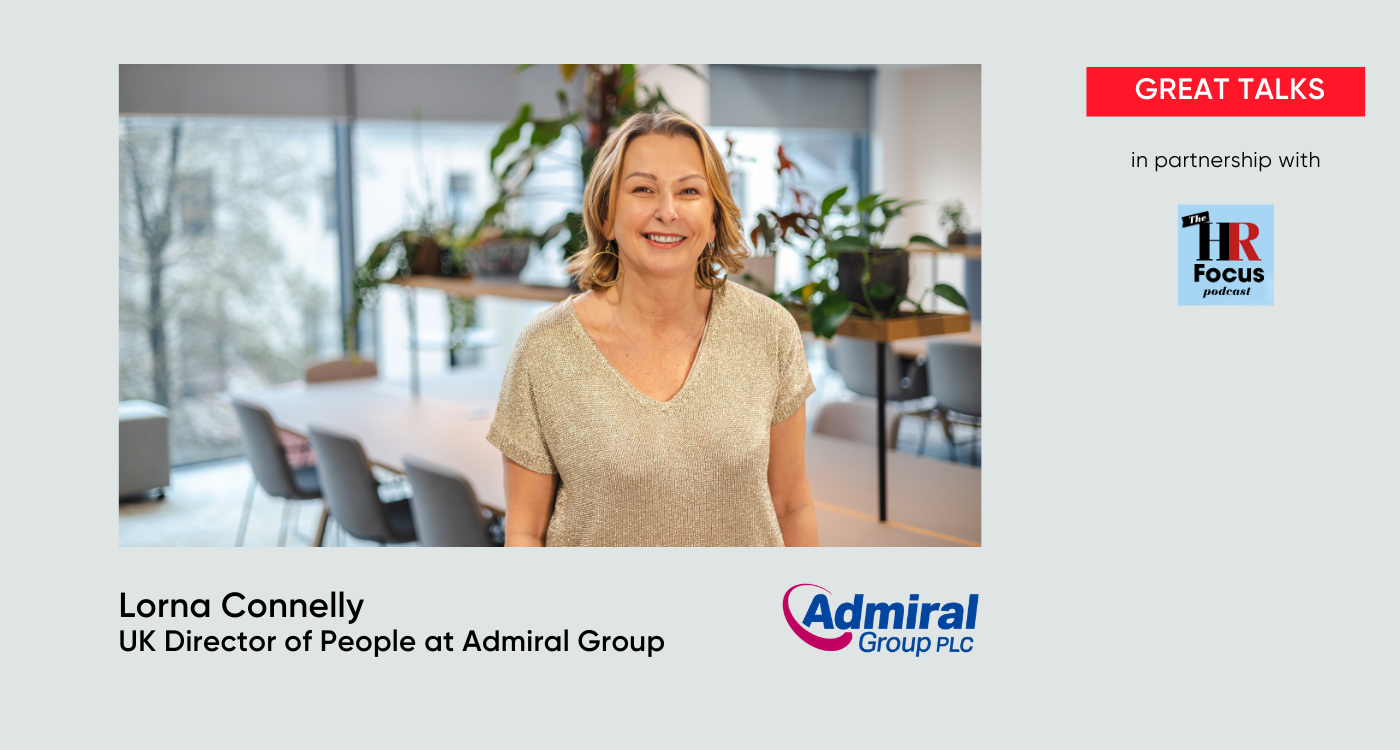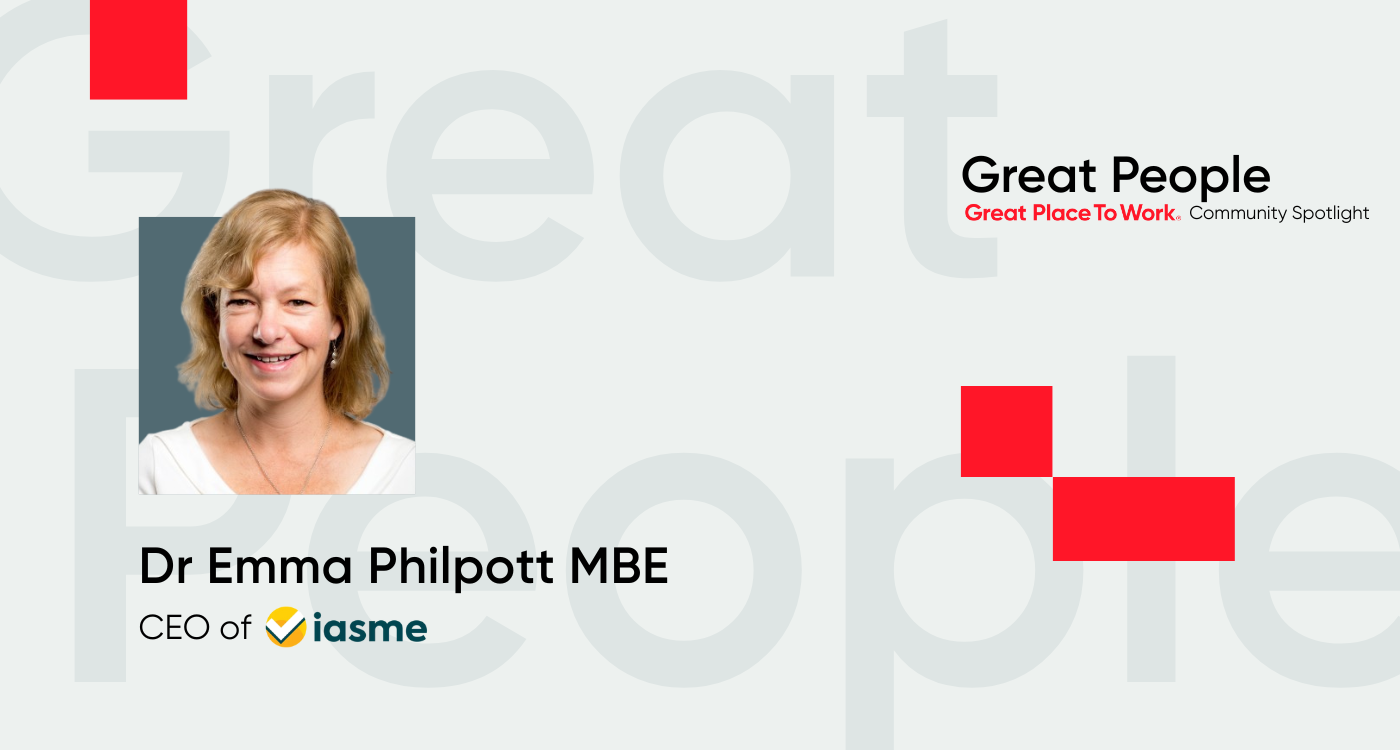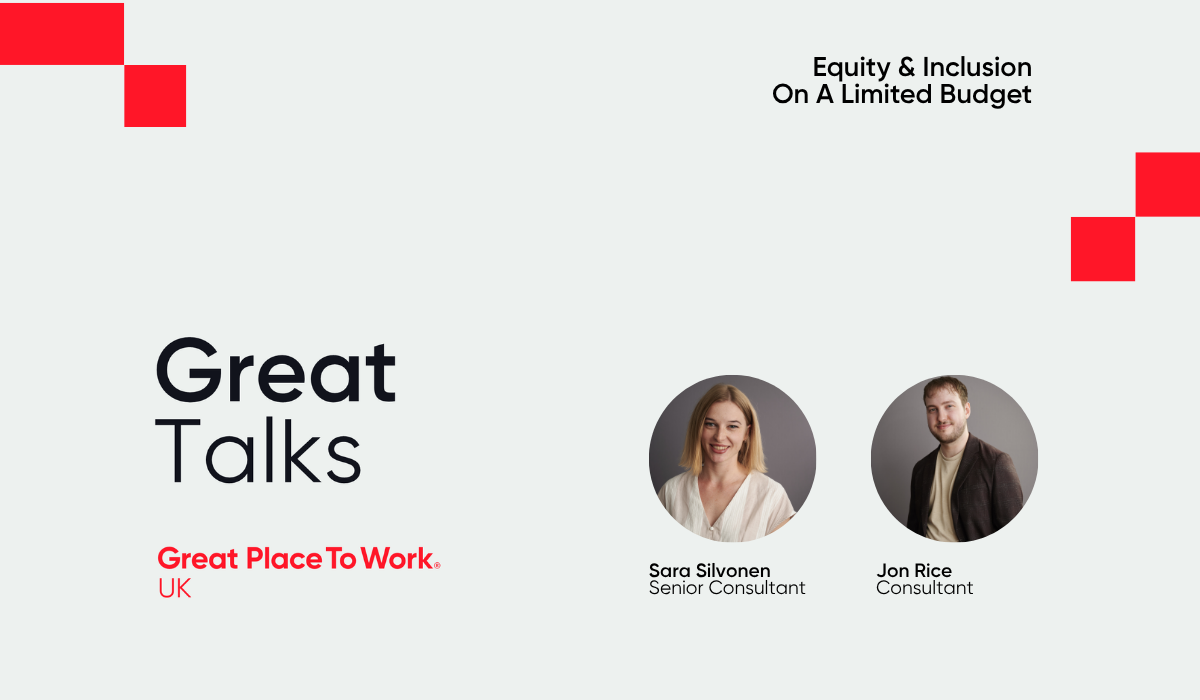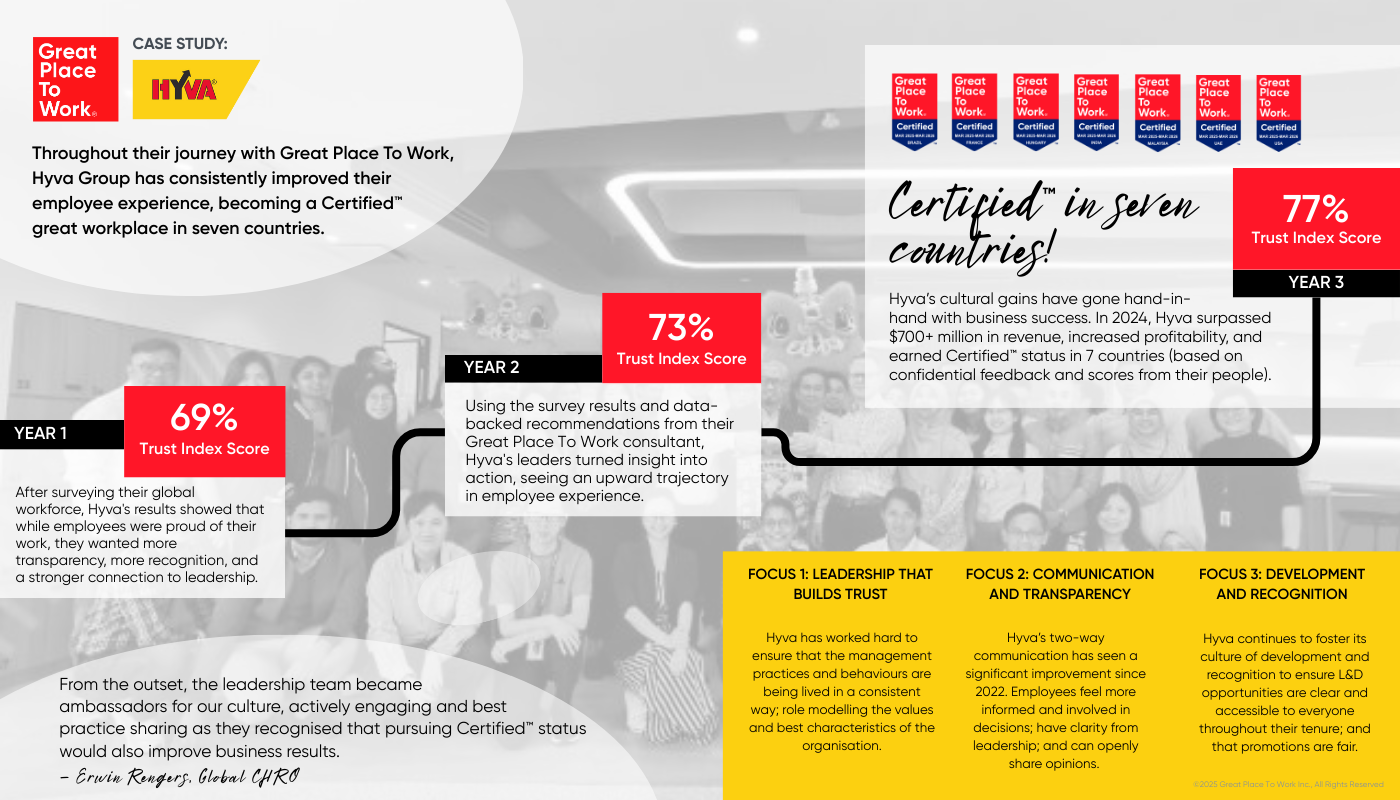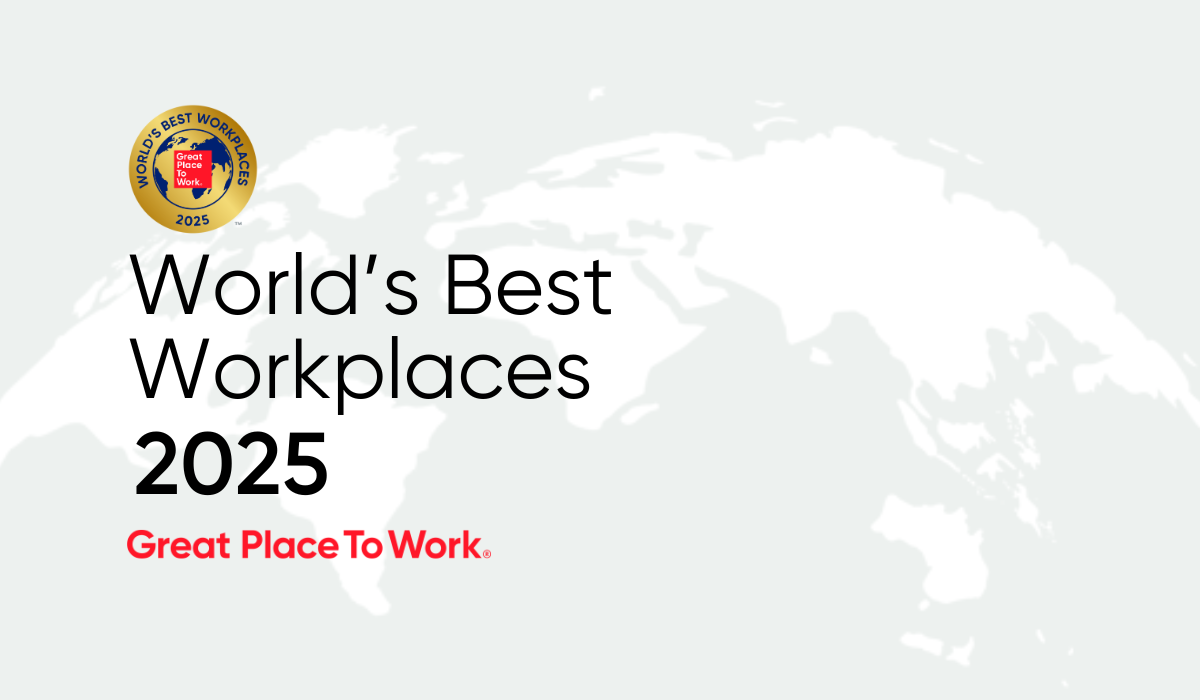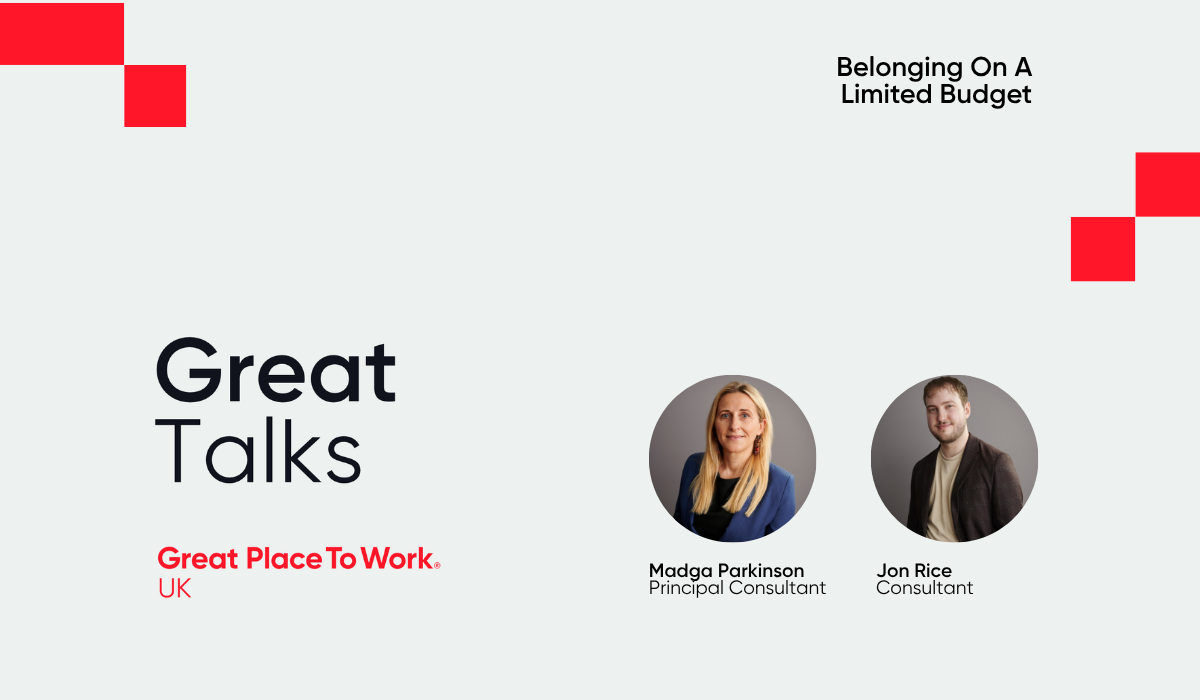In this first installment of our special podcast series with HR Magazine, we speak to one of the UK's most iconic Best Workplaces – Admiral – to find out how the company has remained so consistent in their outstanding culture, narrowing in on how leaders and managers are supported to thrive.
Key Takeaways
Lorna Connelly, Director of People at Admiral shares:
What it means to be a UK's Best Workplace for 25 years:
It's huge! I think people look at surveys sometimes and think, "God, do we have to fill another survey in?" and so on. But I think we do! Increasingly over the years, we've done an even better job at really showing our colleagues how valuable the information is – making sure they feel it's really important to be open and honest about how they're feeling; what they experience working here; what they think we can still improve; and what we need to protect.
I think people take real pride in the results and wait for them to come out. You know, we've always built our culture on reward and recognition. It's great to have something so central for the entire business internationally, as well as in the UK, that we can really focus on and celebrate together.
How to ensure managers don't feel overwhelmed in their role:
Having a clear vision and strategy for the business seems very obvious, but [is so important] for individual areas as well. Really ensuring our leaders and managers understand that, and therefore understand the priorities. So communicating progress, and any change in direction, openly and regularly. Making managers part of that plan is essential because then they understand what they should concentrate their time on and what they don't need to concentrate their time on, particularly when it's busy.
More specifically, we of course invest lots of time in ongoing training and coaching for our leaders to ensure they feel supported and empowered; understand that their role is really to bring out the best in people. And of course, that equally applies to leaders of leaders as well as leaders of all... understanding their strengths, resilience, change, leadership, wellbeing and new skills like AI and so on.
And then moving back to some of the more simple things which are just caring about our people and staying close to them – really working hard to understand them; what they have going on, both personally and professionally, and being able to support them through that. We're currently particularly concentrating on really understanding the diversity of strengths around our leaders as well, and not just expecting managers to do everything themselves – really opening their minds up to what their peers are doing, what other strengths are in other teams, so they can call upon extra support and different views when that's important as well. And especially in a world that seems to be ever changing.
Giving managers confidence:
It is okay to get it wrong sometimes, right? We give our people the confidence, the trust in the organisation to take some risks sometimes. If things don't go as planned, or we find out something doesn't work, then that's fine. So that's an important thing for us increasingly: that real diversity of thought on things and working, not in silos, but really as a team, and as an organisation as well.
Flexible working I think has also been really important to enable managers (and all employees) to control their work-life balance a bit more themselves; to have a bit more say in that, and moving away from the sort of regular nine-to-five, or nine-till-seven, or nine-to-eight – or whatever they were doing before at times when we are particularly busy.
The power of consistency and flexibility during times of change:
Our approach is consistent across all of our people. As leaders, our roles are to bring out the very best of people, right? That's what's critically important. What's different when it comes to managers is a concentration on the ongoing training, ongoing development, really understanding their ambitions in the organisation; really working hard to bring those to life. We've been through huge change across the world, in our industry, in our organisation over the last five years. Change can be tough for all of our colleagues and perhaps at times, particularly for our leaders.
The Trust Index survey feedback has been especially important to us through these times of change, enabling us to really pick out areas where we may be thriving, and other areas where we may be struggling a little bit more, and be able to bring those areas together as well.
As an organisation, we've been determined to allow our leaders to have a bespoke approach to how they work. I don't only mean themselves, but I mean how their areas work as well. So not mandating one rule for all, but really allowing them to be able to think about what's needed in their areas. What are the needs of their colleagues? What are the needs of the customer? Being able to build something that's really flexible in that aspect as well.
So we get a lot of feedback from staff, which is really straightforward and simple. But certainly from our leader's point of view: being able to pick the kids up much more from school, being able to go to appointments much more flexibly, being able to get deliveries, and people to come and build on the house because they're able to work from home much more... those sort of straightforward things have really started to make a difference for our leaders and all of the organisation. But for our leaders particularly, I think it's about that ongoing support and giving them the strengths and the skills they need to be able to lead their teams through change has been key.
How to prepare leaders and managers for future challenges:
Mobility and growth and development within Admiral – it's our DNA really. We've enjoyed such great organic growth over our 30+ year history. I think our colleagues feel that. We don't always get things right, but on the whole they feel like we are supporting their development. And we've done some more work in the last 12 months to really formalise a lot of that.
When thinking about future skills and the changing shape of our organisation, and tech, and more of our customers using digital, and the change in the shape of the organisation that all this causes...we've been more formal in bringing in reskilling programmes and things. Like taking some of our leaders from some of our customer-facing scenarios (where they really understand the customer demands and needs from being so close to those customers in the call centers), to moving those people into roles much more in the tech world where they're being able to help design digital journeys and things like that as well.
To just highlight a couple of the employee survey feedback we've received recently:
"I can't even begin to explain the opportunities that have come my way to develop during my time at Admiral. I absolutely love the journey I've been on so far, and really can't wait to see what lies ahead. I progressed from a Complex Claims Handler to an Automation Protection Analyst to a Squad Lead in just over a year. This is huge achievement for me and I couldn't have done it without the guidance from my manager who just saw something in me." ~ Admiral employee
"I feel like individuals are given opportunities if they are willing to progress within an app role. They aren't always looking for a perfect candidate, but someone they see having potential to succeed in a role and allowing them the time they need to develop." ~ Admiral employee
So you're able to see that we do see the potential in people and we're willing to give them that chance as well.

Succession strategy: How Admiral manages its talent pipeline:
We've always had the strength of talent, been able to grow and diversify organically. That's been a really big advantage for us and allowed us to deepen and protect our amazing culture that we have here.
We love to bring different perspectives to roles and functions and different parts of the business as we launch new products and businesses, and bring insight and experience from other areas as well.
I think a lot of what we've done so far has really been quite manual, and individual. And we really feel we are at a size now where we can bring a much more consistent process in across the board – and that's really designed at being able to get greater visibility across the whole organisation, and look for wider opportunities and insights into that as well.
We rely on continuous conversations to help us draw out colleague aspirations; increasingly make development plans more and more meaningful for people. But we very much approach our talent from both a top-down and a bottom-up strategy. We recognise now, the size we are and the complexity of our organisation, that we need to be even more proactive with it and even more future planning given that skills are changing and needs are changing all the time. We need to be planning what's needed for the future.
And part of the work that we need to do there as well is opening up people's eyes even more, doing more engagement. Telling more stories about people that have moved around the organisation and just sharing that and just really enthuse people even more, I guess, about what the future looks like in their careers.
But please don't go thinking that we never recruit anybody externally either! Internal mobility really is important for us, but we do recognise as well that there are always going to be areas where we need new skills, we need new insight. And so when we see those gaps, we will look to recruit externally then as well. But I think on the whole, the way that we approach mobility here, and our culture here, is really about being an employee for life. What we're really trying to do here is show people that you can come in and there's a career here for life, and you can move around the organisation, whether that's in the UK, whether it's internationally, there's a lot of opportunity at Admiral to do that.
How Admiral measures success of its wellbeing culture:
Wellbeing is challenging. We've got the Great Place To Work survey, we've got pulse surveys, and we've got our People Partnering Team in HR who spend a lot of time in the business with individuals and so on. We look at the feedback we get through our intranet too, through things like confidential feedback; through friendly forums, tea parties.
And of course day-to-day through the engagement that all of our leaders have. For their teams as well. We look at all of our attendance data and we look at our sickness rates and things. We can see any trends there as well. Pleased to say that those are really positive at the moment, and we particularly pull out mental health attendance, things like that as well.
Increasingly, we're investing in wellbeing support across the organisation. We've given our colleagues more and more avenues to be able to call out where they might need help and support and so on.
Data's particularly difficult because people don't always want to share things. So I think the most important thing is the engagement: having people on the ground, checking in with people, just making sure they know people really well and they can understand and see a difference if somebody does need some more support. So I think it comes back to those sort of engagement fundamentals and caring about the people that we work with that really makes the difference there.
How leaders can get the maximum value out of their employee survey data:
We've been part of the Trust Index survey for 25 years. And of course we've evolved over that time how we use the data. At a high level, it helps us to benchmark across our business. So internally, it's really helpful for us and it helps us to understand 'Are we managing change where we may really need to concentrate more efforts?'
We have a small but a dedicated team of experts that look at all the data for us and analyse it. And then people within that team drive engagement through the organisation as well, through that People Partnering Team that I talked about, and all of our leaders and help them really understand the data and therefore the results as well.
But of course, we don't just look at a Great Place to Work data in isolation. We combine it with pulse data that we do internally ourselves – other key metrics like retention, attendance, mobility – and use the data to really help us to pick out the key trends. My advice would be like anything, don't just look at the data in isolation. You have to look at it more deeply, and take into account other circumstances and look at what's really going on across the organisation as well, to put things into context.
And I think over the last few years we've become much stronger at ensuring we communicate a clear plan after the results come in. So we pick out three or four areas where we really feel we're going to concentrate our focus to improve things going forward. And then we'll keep going back to the business every few months to give an update on where we are.
Trust and the openness and honesty we mentioned earlier as well. And making people feel: 'Look, I want be honest in the survey because it really will make a difference.' So this isn't about just getting in that top place [on the Best Workplaces List]. This is about continuous improvement across the organisation. Everybody being in that together.
🎧Up next: Employee Wellbeing On A Limited Budget
In this next podcast, our very own culture experts Sara Silvonen (Wellbeing Lead and Senior Consultant) and Jon Rice (Consultant) share their tips for how employers can support employee wellbeing without breaking the bank. Listen here.
